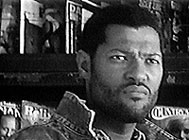|
|
|
|
Deep
Cover
|
 |
Deep Cover is one of the most accomplished and
compelling crime thrillers of the 1990s. It crackles with an energy that begins
right from the opening credits, as it guides us effortlessly through the moral
labyrinth of its complex undercover plot set within an international drug ring.
From the first moments, it is
unusual and compelling. Its superbly crafted voice-over narration, as delivered
by Larry Fishburne as John, has the cadence and literary flourishes of
contemporary spoken-word poetry. The plot’s sometimes outrageous air of
limitless possibility and digression includes a corrupt and psychotic lawyer
(Jeff Goldblum as David) who talks in philosophical maxims (“In dreams begin
responsibilities”), and practices sophisticated perversions; a diminutive
police agent (Charles Martin Smith as Gerald) who likes to refer to himself as
“God”; a money-launderer (Victoria Dillard as Betty) who runs a gallery for
African art; and an earnest Reverend (Clarence Williams III as Taft) who presses
prayer books onto lawbreakers. Even John himself, we are told, has the “exact
psychology” of a violent criminal!
The
film is brave, too, in its subversive message of anti-government critique, its
refusal to tie up its dilemmas too neatly and, in its final line, the explicit
posing of a moral-political question to the viewer (“What would you do?”).
When
Duke (well-known as an actor) made Deep
Cover, he was coming off the success of the stylish gangster piece A Rage in Harlem (1991). Although he has subsequently directed other features (including Hoodlum, 1997) with an African-American
focus, his career has continued mainly in television. Deep Cover remains, to date, his finest work.
At
the moment of its initial release, Deep
Cover seemed to be channelling the streamlined, hardboiled manner of James
B. Harris’ brilliant Cop (1987). Clearer today is its enormous debt to Abel
Ferrara’s King of New York (also shot by Bojan Bazelli, and featuring
Fishburne in a radically different part); it overlaps uncannily, too, with Bad Lieutenant (1992), released around the same time. Like Ferrara, Duke expertly uses
experimental techniques (such as step-printing frames, and jump-cutting to hip-hop
beats), and the violent action scenes have a startling, kinetic force. All
these films with which Deep Cover forms a tight network are impeccable models in their (expanded) genre.
Writers Michael Tolkin (The Player,
1992) and Henry Bean (Internal Affairs,
1990) take a narrative staple of film noir – the anti-hero in a spiral of
trouble, unable to escape without making a bold move “beyond the law” – and
build upon it a complex meditation on morality and amorality: as in Ferrara’s
work, it is not good (or law) which vanquishes evil, but the intensification of
evil itself, a transgressive identification with the power of evil. These frankly religious and philosophical themes
definitely connect to Tolkin’s previous work on The Player (adapted from his novel) and especially the sui generis The Rapture (1991).
Deep Cover mixes these
noir elements with a popular contemporary plot device: the undercover cop who
gradually loses his identity, as in Cruising (1980), Donnie Brasco (1997), and The
Departed (2006). As fascinating, ultimately, as the central character’s
dark journey is the arc that takes David (Goldblum at his most wonderfully
inventive) from being a meek lawyer – similar to the Sean Penn character in De
Palma’s Carlito's Way (1993) – to the heights of Nietzschean delirium: chanting “I
want my cake and eat it too”, challenging gangsters to knuckle fights, and
quoting (complete with Cuban accent) the motto from Scarface (1983) – “My balls and my word” – at the height of a tense
negotiation.
Such
blackly comic pop culture references make a potent blend with everything else
the film lays out so deftly and jazzily.
MORE Duke: The Cemetery Club © Adrian Martin September 1993 / October 2008 |
![]()